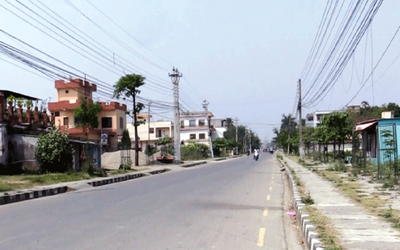The worsening instability, particularly in the Gulf countries, has increased worries about the security of around one million Nepali workers and the national economy that is dependant on the remittance they send back home.
Every year, Nepal receives around Rs 230 billion as remittance from almost two million Nepali migrant workers spread around the world.
Of the total, half of the workers are stationed in the Gulf countries alone.
The uprisings in that part could severely derail stability back home, warn experts.
Raging Flame
The flame of uprising that started three months ago in Tunisia is engulfing Arab countries one after another – Egypt, Libya, Yemen, Oman and Bahrain.
In the last one decade, the remittance receipts have become the mainstay of the Nepali economy.
In that, the stability of the Gulf countries is as important – at least from economic perspective – to Nepal as is its domestic political stability.
But the scenes of popular unrest, street protests and rebellion in streets of Arab that have hugged the world headlines since last three months is now threatening to unravel the stability that had marked the Arab world for many decades.
Analysts also fear that since the protesters have, often times, raised sentiments of ‘nationalism,’ the future of foreign employees hangs in balance.
The future dispensation in these countries may be lesser inclined to importing laborers, they say.
“This is certain to have long lasting impact on Nepal. If the agitation spreads and results in regime change in countries such as Bahrain or Kuwait or United Arab Emirates, then we have absolutely no idea how the future government would react to foreign employment. This can invite an unfortunate situation for us,” said Nishchal Nath Pandey, Director of Centre for South Asian Studies.
He also regrets what he calls total indifference on the part of the government towards the unravelling situation in the Gulf despite its tremendous implications for Nepal.
The economists do not think that such a situation is impossible. They warn that it could have tsunami-like impact on Nepal’s economy.
“If due to the current Arab uprisings the remittance flow is affected, then that will break the backbone of Nepali economy. That can trigger a financial earthquake. In fact, that can even unleash another political explosion in the country,” said Dr. Bishwambher Pyakuryal, an economist.
He points out to the fact that every year around 400,000 Nepalis come looking for job in the employment market. “We do not have industries to take all of those workers. Therefore, for the time being, we have no alternative other than the foreign employment.”
The latest data show that in the six member countries of the Gulf Cooperation Council – Bahrain, Oman, Kuwait, Qatar, Saudi Arabia and UAE – there are almost one million Nepali migrant workers.
In Bahrain, where the agitation has intensified, there are around 20,000 Nepali workers. In Saudi Arabia, where protests have largely been sporadic, there are 450,000 Nepali workers.
Former Finance Minister Surendra Pandey agrees that it will not be in the long-term interest to bind national economy so firmly with the foreign employment that is vulnerable to factors outside the control of the country.
“We must go for building national industries. There is no alternative to that. We are living in glass house at the moment,” he said.
The scariest part is what happens if the situations in Gulf Arab countries deteriorate to the level seen in Libya. The officials shudder to even think about the prospects of mass rescue.
- TANAHU HYDROPOWER PROEJCT: A Significant Achievement
- Apr 15, 2024
- AMBASSADOR HANAN GODAR: Sharing Pain With A Nepali Family
- Mar 30, 2024
- VISIT OF KfW AND EIB TO NEPAL : Mission Matters
- Mar 25, 2024
- NEPAL BRITAIN SOCIETY: Pratima Pande's Leadership
- Mar 24, 2024
- NEPAL ARMY DAY: Time To Recall Glory
- Mar 15, 2024
















